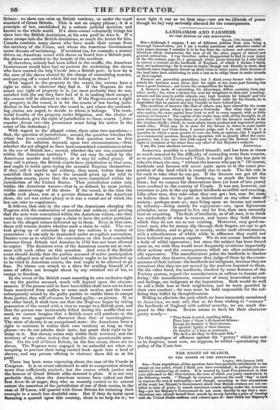LANDLORDS AND FARMERS.
TO THE EDITOR OF THE SPECTATOR.
Sussex, Ilth January 1842.
SLR—Although I suppose I am of different politics from you, being a thorough Conservative, yet I am a weekly purchaser and attentive reader of your paper, because I consider it to be free from the violence and extreme one- sidedness which characterize the tone of aU the other papers of talent: and general estimation. I was therefore rather disappointed to find in your paper of the 8th instant, page 37, a paragraph which seems intended by a side-wind to convey a censure on the landlords of England, of which I declare I think they are undeserving : for it seems to imply, though not directly to state, that landlords have improperly forced up their rents in latter years, while farmers of the land have been cultivating to such a loss as to oblige them to make inroads on their capital.
Farmers are proverbial grumblers; but I think every farmer who under- stands his business must allow, that for eight or ten years past farming has been a good business ; and hence the competition for farms. A farmer's mode of calculating his advantages differs certainly from any other mode ; for, when a farmer has sent his daughters to first-rate boarding- schools and his sons to public schools, nay, kept hunters for himself and two or three at least of his sons, and has kept a liberal table for his friends, he is dissetisfied that he cannot also buy Consols to leave behind him.
The condition of farmers, like that of others, may have altered for the worse since the war prices, when a farm was a Golconda. But what class of men who employ the same capital have lived so well in every respect, with so little anxiety, as farmers ? The capital of the trader may, with all his foresight, be at once consumed by the imprudence of another : but the farmer's anxiety is for the weather chiefly ; which, he must admit, treats prudent and imprudent pretty much alike. What may be in store for the farmer in times to come under your proposed new Corn-laws, I cannot judge, and I do not think it is question on which a mere grower of corn can form an opinion, (for I regard it as a commercial question, though its operation will so greatly affect the corn- grower); but I am sure that with regard to the past, the farmers have less right to complain of the times than any other of her Majesty's subjects.
AGRICOLA. possibly is a landlord himself; and has been at times so much annoyed by the difficulty of extracting rents from tenants, as to protest, with COWPER'S Vicar, it would give him less pain to take ten times the sum, "without the knaves who pay it." Of course, landlords and farmers will never quite agree as to the exact pro- portion of the land which is exactly due to each. The fair rule is for each to take what he can get. If the farmers can get all the good things enumerated by AGRICOLA, so much the better for them; but we suspect his observations have (at least of late years) been confined to the country of Utopia. It was not, however, our intention to join in the cry against landlords as selfish and exacting. Like other men, they take what they can get ; but, man for man, we believe them to be quite as benevolent as any other class of society : perhaps more so; men living upon an income not earned by industry—living mainly for enjoyment—are, upon Epicurean principles, more disposed to live and let live, than men earnestly bent on acquiring. The fault of landlords, as of all men, is to think too exclusively of what is nearest, and hence they hold distress which they do not see as not existing. Moreover, easy good-na- tured men, who let money slip through their fingers, are apt to get into difficulties, and to grasp at money, under such circumstances, with a relentlessness of which while in affluence they could not have believed any person capable. We do not accuse landlords as a body of wilful oppression ; but since the subject has been forced upon us, we wish they would more frequently scrutinize impartially their actions and the consequences, which are often unintention- ally oppressive. The manufacturers paint the landlords in blacker colours than they deserve, because they judge of them by the conse- quences of their actions: the landlords are indignant, because they are conscious that they are not moved by the motives imputed to them. On the other hand, the landlords, shocked by some features of the Factory system, regard the manufacturers as callous to human suf- fering : the manufacturers, conscious of many benevolent actions and feelings, are indignant at the imputation. Both would do well to rail a little less at their neighbours, and be more guarded in their own conduct ; for men must be held responsible for the suf- fering they inflict by thoughtlessness.
Willing to alleviate the pain which we have innocently occasioned to AcineorA, we may add, that so far from wishing to "censure" the landlords of England with unkind severity, we are much dis- posed to like them. &ass seems to have hit their character pretty nearly-
" Thee frank-hearted, rambling billies, • Fient hate o' them 's ill-hearted fallovrs: Except for breakin• o' their timmer, Or speakin' lightly o' their limmer, Or shootin' o' a hare or muircock, The dell a bit they 're ill to pair folk."
To this catalogue of offences against the " gentry " which are ria to be forgiven, must now, we suppose, be added—questioning the policy of the Corn-law.


























 Previous page
Previous page